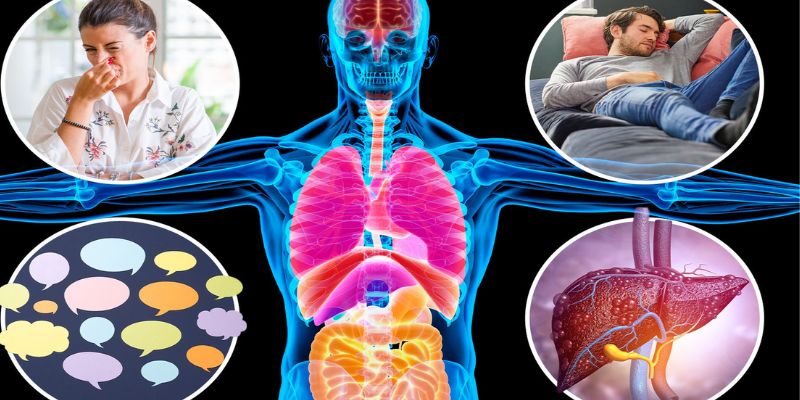Do you ever experience extreme fatigue, anxiety, and depression for no apparent reason? Do your friends tell you that you smell like beer or alcohol when you don't drink any? You may be suffering from a rare medical disorder known as Auto Brewery Syndrome (ABS), caused by an overload of yeast in the body.
This blog post will explore what ABS is, how it works, and the various treatments available to help manage this condition. Be sure to check out this comprehensive guide on Auto Brewery Syndrome so that if these symptoms sound familiar, you can get yourself diagnosed and potentially treated.
What is Auto-Brewery Syndrome

In the uncommon medical illness known as auto brewery syndrome, sometimes called gut brewing syndrome or deliberately endogenous ethanol fermentation, the gastrointestinal tract overproduces ethanol (alcohol) by fermenting carbohydrates.
It is characterized by the presence of high blood alcohol levels without the consumption of alcoholic beverages.
In individuals with auto-brewery syndrome, certain types of yeast or bacteria in the digestive system, particularly Saccharomyces cerevisiae, convert ingested carbohydrates into ethanol. This fermentation occurs in the intestines and produces alcohol, which is absorbed into the bloodstream, leading to elevated blood alcohol levels.
What are the symptoms

The symptoms of Auto Brewery Syndrome (ABS) can vary among individuals, but some common symptoms include:
Drunk without drinking alcohol
Individuals with ABS may experience the feeling of intoxication and exhibit signs similar to being drunk, even when they have not consumed any alcoholic beverages.
Becoming very drunk after consuming a small amount of alcohol
Even a small amount of alcohol, such as one or two beers, can lead to exaggerated intoxication in individuals with ABS.
Red or flushed skin
Flushing or reddening of the skin can occur due to elevated blood alcohol levels.
Dizziness
Dizziness and light headedness are common symptoms associated with ABS.
Disorientation
ABS can cause confusion and disorientation, making it difficult for individuals to maintain their normal alertness and focus.
Headache pain
Some ABS sufferers may experience headaches, which can be similar to the ones experienced after consuming alcohol.
Nausea and vomiting
ABS can lead to feelings of nausea and may cause individuals to vomit.
Dehydration
Elevated blood alcohol levels and associated symptoms can lead to dehydration, thirst, dry mouth, and decreased urine output.
Burping or belching
Excessive ethanol in the gut can increase gas production, leading to burping or belching.
Fatigue
Fatigue and a general sense of tiredness are common symptoms in ABS, potentially caused by the effects of elevated ethanol levels on the body.
Memory and concentration problems
ABS can impair cognitive function, leading to memory, concentration, and mental clarity difficulties.
Mood changes
ABS can cause mood swings, with individuals experiencing fluctuations in their emotional state.
Auto Brewery Syndrome can also be associated with or exacerbate other health conditions, including:
- Chronic fatigue syndrome: The fatigue experienced in ABS can overlap with chronic fatigue syndrome, potentially worsening the symptoms associated with this condition.
- Irritable bowel syndrome: ABS may contribute to or worsen symptoms of irritable bowel syndrome (IBS), such as abdominal pain, bloating, and changes in bowel habits.
- Depression and anxiety: The impact of ABS on the body and the associated symptoms can hurt an individual's mental health, potentially contributing to or exacerbating symptoms of depression and anxiety.
What are the causes
Auto-brewery syndrome, or gut fermentation syndrome, can be caused by several factors, including:
Overgrowth of yeast
The presence of excessive amounts of yeast in the gut, such as Candida albicans, Candida glabrata, Torulopsis glabrata, Candida krusei, Candida kefir, and Saccharomyces cerevisiae (brewer's yeast), can contribute to the auto-brewery syndrome. These yeast species can ferment carbohydrates into ethanol.
Imbalance in gut microbiota
Disruptions in the balance of microorganisms in the gastrointestinal tract, including an overgrowth of yeast and a decrease in beneficial bacteria, can create an environment favorable for ethanol production.
Use of antibiotics
Antibiotics can disturb the natural balance of microorganisms in the gut, potentially leading to yeast overgrowth and auto-brewery syndrome.
Underlying medical conditions
Certain underlying medical conditions, such as diabetes, obesity, and digestive disorders, may increase the risk of auto-brewery syndrome. These conditions can affect the gut environment, promoting yeast overgrowth and fermentation.
Diagnosis of Auto-Brewery Syndrome
Auto-Brewery Syndrome (ABS) diagnosis can be challenging due to its rarity and similarities with other conditions. Here are the key aspects of diagnosing ABS:
Medical History
The doctor will review the individual's medical history, including symptoms, alcohol consumption patterns, and any relevant underlying medical conditions or medications.
Symptom Evaluation
The doctor will assess the symptoms reported by the individual, such as feelings of intoxication, dizziness, brain fog, and impaired coordination. They may inquire about the timing of symptom onset and exacerbation of carbohydrate-rich meals.
Blood Alcohol Level Testing
Measurement of blood alcohol levels is crucial for diagnosing ABS. The doctor may conduct blood tests to assess the ethanol concentration in the individual's blood. These tests may be done during and after a fasting period and after consuming a carbohydrate-rich meal to observe any significant changes in blood alcohol levels.
Breathalyzer Tests
Specialized breathalyzer tests may be performed to measure breath alcohol concentration before and after a carbohydrate-rich meal. This can help confirm the production of ethanol in the gastrointestinal tract.
Elimination of Other Causes
Other potential causes of elevated blood alcohol levels, such as alcohol consumption, metabolic disorders, or liver dysfunction, must be ruled out. Additional tests, such as liver function or genetic testing, may be conducted as needed.
Response to Treatment
If initial tests indicate the presence of ABS, the doctor may recommend dietary modifications and medications to address the condition. Monitoring the individual's response to treatment can further support the diagnosis.
Treatment of Auto-Brewery Syndrome
Treating Auto-Brewery Syndrome (ABS) involves a combination of dietary modifications and medications. Here are some key aspects of the treatment approach:
Dietary Modifications
Following a strict diet is crucial in managing ABS. The primary goal is to reduce the intake of carbohydrates and sugars, which are fermented into ethanol by the gut microorganisms. The recommended dietary changes include:
- Avoiding sugary foods and beverages such as candies, desserts, soda, and fruit juices.
- Eliminating simple carbohydrates like white bread, pasta, rice, and refined flour products.
- Choosing complex carbohydrates higher in fiber, such as whole grain bread and pasta, brown rice, vegetables, fruits, and legumes.
- Incorporating fresh and dried herbs, oats, barley, bran, lentils, quinoa, and couscous into the diet.
Medications
Antifungal Drugs
Medications such as fluconazole or nystatin may be prescribed to combat the overgrowth of yeast in the gut. These antifungal drugs help control the fermentation process and reduce ethanol production.
Oral Antifungal Chemotherapy
In severe cases or when other antifungal medications are ineffective, oral antifungal chemotherapy drugs may be considered. These are stronger medications that are used to treat systemic fungal infections.
Probiotics
Acidophilus tablets or other probiotics may be recommended to restore the balance of gut microorganisms. Probiotics can help promote the growth of beneficial bacteria and inhibit yeast growth.
Regular Monitoring and Follow-up
Individuals with ABS will require close monitoring of symptoms, blood alcohol levels, and response to treatment. The treatment plan may be adjusted based on the individual's progress.
FAQs
Can you suddenly develop auto-brewery syndrome?
Yes, the auto-brewery syndrome can develop suddenly or gradually over time. Factors such as diet, use of antibiotics, and underlying medical conditions can increase the risk of developing ABS.
Is auto-brewery syndrome dangerous?
Auto-brewery Syndrome is not life-threatening but can lead to serious health complications if left untreated.
How do I know if I have an auto-brewery syndrome?
If you experience symptoms such as intoxication, dizziness, brain fog, and impaired coordination without any alcohol intake, it is best to consult a doctor. The doctor can assess your medical history and perform tests to determine if you have ABS.
Conclusion
Auto-Brewery Syndrome is a rare disorder that can cause serious medical and psychological complications. While its exact cause isn't known, it is presumably caused by altered gut flora in response to certain medications or other factors. Symptoms often mimic those of alcohol intoxication, and diagnosis requires comprehensive testing. Fortunately, there are treatments likely to be successful in alleviating symptoms if you have Auto Brewery Syndrome - such as dietary changes, probiotic supplements, antifungals, or antibiotics - which should be discussed with your healthcare provider.




